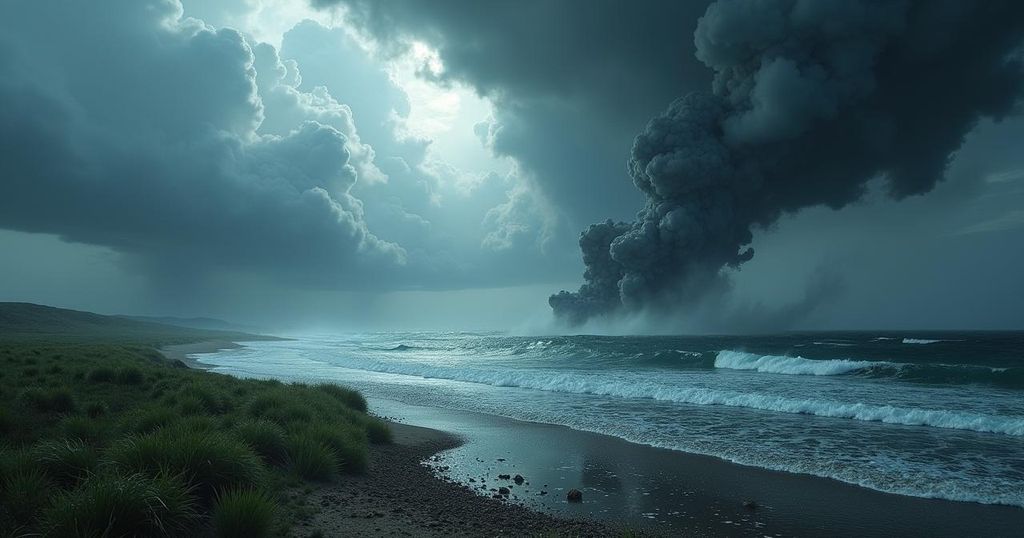Climate Change Amplifies Hurricane Helene; Similar Effects Likely for Milton

A recent study shows that human-caused climate change has aggravated Hurricane Helene’s rainfall by 10% and wind speeds by 11%. As Hurricane Milton threatens Florida, researchers warn that the same climate-induced impacts may apply, leading to a future of more intense hurricanes fueled by warming waters due to fossil fuel consumption.
Recent scientific analysis indicates that human-induced climate change has significantly exacerbated the severity of Hurricane Helene, increasing its rainfall by approximately 10% and intensifying wind speeds by roughly 11%. This study, conducted by World Weather Attribution (WWA), revealed that Helene’s winds were propelled by 13 additional miles per hour, with sea temperatures in the Gulf of Mexico registering between 3.6 degrees Fahrenheit (2 degrees Celsius) above average. The climate alterations have made conditions that fueled Helene’s intensity 200 to 500 times more probable, as reported on Wednesday from Europe. Ben Clarke, a co-author of the study and climate researcher from Imperial College London, elaborated, “Hurricane Helene and the storms that were happening in the region anyway have all been amplified by the fact that the air is warmer and can hold more moisture, which meant that the rainfall totals — which, even without climate change, would have been incredibly high given the circumstances — were even higher.” The researchers predict that Hurricane Milton, which is currently threatening the Florida coast, may experience similar enhancements in intensity attributable to climate change. The study underscores the grim reality that continued fossil fuel consumption will lead to an increase in frequency and severity of hurricanes like Helene, which resulted in substantial inland flooding leading to many casualties, more so than those caused by wind damage alone. Hurricane Helene made landfall with unprecedented storm surges and sustained winds reaching 140 miles per hour, wreaking havoc across multiple states including Florida, Georgia, the Carolinas, Tennessee, and Virginia, causing significant infrastructure damage, massive outages, and sadly resulting in over 230 fatalities. Meteorologists estimate that Helene unleashed over 40 trillion gallons of rain; an unprecedented deluge likely intensified due to climate change, emphasizing the quantitative impact of even slight increments in rainfall on storm destructiveness. The analysis concludes that hurricanes of Helene’s magnitude were historically expected every 130 years but are now approximately 2.5 times more likely due to climate change. WWA’s evaluations, though unpeer-reviewed, employ rigorously peer-reviewed methodologies. In parallel, a separate study from Lawrence Berkeley National Lab determined that climate change resulted in 50% more rainfall in certain areas due to decreased return periods for such rainfall events. Experts highlight that while uncertainty remains regarding the exact quantification of climate change’s impact on storm dynamics, the evidence suggests a clear trend toward increased storm intensity. Kim Cobb, Director of the Institute at Brown for Environment and Society, emphasized the urgency for emergency preparedness in the wake of such events. “Helene and Milton should serve as a wake-up call for emergency preparedness, resilience planning, and the increased use of fossil fuels,” she advised. As climate change continues to evolve, the potential for new record-breaking storms looms large unless there is a significant alteration in energy consumption behaviors and a transition away from fossil fuel dependency. Clarke stated, “As we go into the future … we still have control over what trajectory this goes in,” stressing that our choices today will influence future climatic and economic costs.
The phenomenon of climate change, primarily driven by human activity, has been recognized as a critical factor contributing to the increased frequency and severity of extreme weather events, including hurricanes. This specific analysis focusing on Hurricane Helene—and the potential impacts of Hurricane Milton—underlines the urgent need to understand how climate changes are directly affecting storm behavior and intensifying rainfall and wind speeds. This data is essential for future preparedness and mitigation strategies to deal with the aftermath of such hurricanes, and the research is conducted by reputable institutions that specialize in climate science and attribution studies.
In summary, the findings highlight that human-induced climate change has magnified the intensity and destructiveness of Hurricane Helene and presents similar risks for Hurricane Milton. This serves as a pivotal warning for addressing climate-related risks and adapting emergency preparedness strategies to mitigate future impacts. The evidence suggests that without a significant shift in energy practices, upcoming decades may see increasingly severe weather events with catastrophic potential.
Original Source: www.kxnet.com








